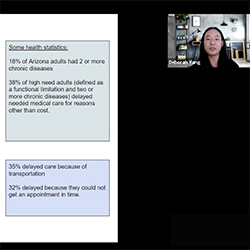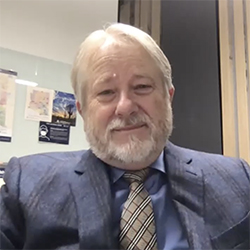Community Stakeholders Discuss Primary Care, Public Health and Prevention in the Era of COVID-19
In an effort to shed light on the primary care crisis in Arizona and the challenges of the coronavirus pandemic, the University of Arizona College of Medicine – Phoenix Primary Care Scholars Program hosted a town hall with various stakeholders in the community.
The 2nd Annual Primary Care Advocacy Town Hall took place on Sept. 29 via Zoom, as part of Primary Care Week.
“Now, more than ever, the COVID-19 pandemic has exposed the need for primary care and only worsened the existing shortage of access to primary care doctors,” said Shahrzad Saririan, MD. “A health care system with a strong primary care infrastructure achieves better health outcomes by preventing and effectively managing chronic diseases that increase our susceptibility to serious illness and death. Primary care can better address social determinants of health among vulnerable populations that have increased and intensified during this pandemic.”
Dr. Saririan, who is the founding director of the Primary Care Scholars Certificate of Distinction and director of the Family, Community and Preventive Medicine Clerkship, said she hopes students use this session to educate the public and raise our awareness for the critical importance of primary care in our state.
The town hall began with an introduction by leadership, including Jeffrey Wolfrey, MD, chair of the Department of Family, Community and Preventive Medicine, and Guy Reed, MD, MS, dean of the College of Medicine – Phoenix, who recognized the challenges of primary care in the state of Arizona, specifically during the pandemic, and the need for more primary care physicians.
“We are blessed at the college to have outstanding primary care leadership, who have developed certificate of distinctions, scholarships, innovative educational approaches, such as the longitudinal integrative curriculum that creates opportunities for our students to see and experience the value of careers in primary care and rural medicine,” Dean Reed said. “We are also working with hospital partners and others across the state to expand residency training here in Arizona, so we can retain these exceptional new physicians; and they remain in the state and serve Arizona.”

“Prevention starts with public health and primary care, but it also requires community support and cooperation,” Yang said. “To build that community support, we need trust and clear communication between every aspect of society, from our political and economic leaders to educators and individual families. I hope that the conversations during this town hall will be an opportunity to move toward those goals. I also hope that everyone who participated in this event will come away with a heightened awareness of the pandemic's impacts on primary care and public health and be able to translate that awareness into urgent action at local, state and federal levels.”
The event included a keynote presentation from Daniel Derksen, MD, Walter H. Pearce endowed Chair and director of the University of Arizona Center for Rural Health. Dr. Derksen, who is also a professor of Public Health, Medicine and Nursing at the University of Arizona, discussed navigating primary care, public health and prevention in the era of COVID-19.
“We do incredibly important work taking care of patients and managing them in the context of their family and community,” Dr. Derksen said. “I think our role is particularly important these days in helping draft legislation, or providing expert testimony to support legislation that improves health policy. We have to translate this data and information to policy actions and make it intelligible and actionable to patients and legislators that represent us.”

“In addition to the wonderful patient care that you will deliver, which is much needed in Arizona and around the country, it’s important to also keep in mind, you are trusted spokespeople,” Dr. Derksen said. “You may not feel that way as students and residents, but you are. People really do want to hear your voice and hear what is happening with your patients, in your practice, in your training and how we can do better. We need your voice to be added to others so we can change things for the better.”
The event included a panel discussion from various stakeholders from the community. Panelists included Heather Carter, EdD, Arizona State Senator; Lisa Villarroel, MD, MPH, medical director of Public Health Preparedness at Arizona Department of Health Services; Katie Brite, MD, associate dean of Clinical and Competency Based Education; Judith Hunt, MD, a clinical assistant professor of Internal Medicine, and Austin Cotter, a second-year medical student. The event concluded with a Q&A session where attendees were invited to ask questions to presenters.
“Primary care is being drastically transformed because of COVID-19,” Yang said. “Whether that transformation is for the better or not depends on all of us. I hope that this town hall will prompt community members to take further steps to support primary care as we move forward in this new era of medicine, and make primary care and prevention the priorities that society needs them to be.”
About the College
Founded in 2007, the University of Arizona College of Medicine – Phoenix inspires and trains exemplary physicians, scientists and leaders to advance its core missions in education, research, clinical care and service to communities across Arizona. The college’s strength lies in our collaborations and partnerships with clinical affiliates, community organizations and industry sponsors. With our primary affiliate, Banner Health, we are recognized as the premier academic medical center in Phoenix. As an anchor institution of the Phoenix Bioscience Core, the college is home to signature research programs in neurosciences, cardiopulmonary diseases, immunology, informatics and metabolism. These focus areas uniquely position us to drive biomedical research and bolster economic development in the region.
As an urban institution with strong roots in rural and tribal health, the college has graduated more than 1,000 physicians and matriculates 130 students each year. Greater than 60% of matriculating students are from Arizona and many continue training at our GME sponsored residency programs, ultimately pursuing local academic and community-based opportunities. While our traditional four-year program continues to thrive, we will launch our recently approved accelerated three-year medical student curriculum with exclusive focus on primary care. This program is designed to further enhance workforce retention needs across Arizona.
The college has embarked on our strategic plan for 2025 to 2030. Learn more.